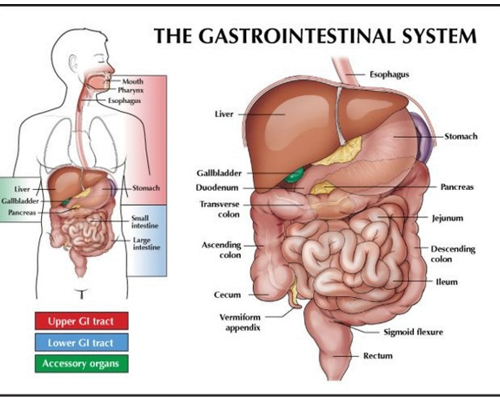
About Medical Gastroenterology
Gastroenterology is the branch of medicine focused on the digestive system and its disorders.
Diseases affecting the gastrointestinal (GI) tract, which include the organs from mouth into anus, along the alimentary canal, are the focus of this specialty. Hepatology, or hepatobiliary medicine, encompasses the study of the liver, pancreas, and biliary tree, while proctology encompasses the fields of anus and rectum diseases. They are traditionally considered sub-specialties of gastroenterology.
Who is a Gastroenterologist?
These specialists primarily diagnose and treat gastrointestinal (GI) diseases in both men and women.
They perform endoscopic procedures, in which they use specialized instruments to view the GI tract and make a diagnosis. They don’t perform surgery. In some cases, they may work closely with a GI surgeon. They primarily work in a clinic or hospital setting.
The gastrointestinal (GI) system:
- Digests and moves food
- Absorbs nutrients
- Removes waste from your body
Gastroenterologists can treat any part of this system.
Other parts of the gastrointestinal (GI) system include the:
- Pharynx
- Esophagus
- Stomach
- Small intestine
- Large intestine
- Liver
- Gallbladder
- Pancreas
- Salivary glands
- Tongue
- Epiglottis
- Rectum
- Anus
Proctologists also treat diseases of the rectum and anus.
What conditions do gastroenterologists treat?
These specialists treat a number of conditions affecting the GI system. This can include:
- Acid reflux
- Ulcers
- IBS (Irritable Bowel Syndrome)
- Hepatitis C
- Polyps, or growths, which typically occur in the large intestine
- Jaundice, or a yellowing of the skin
- Hemorrhoids
- Bloody stool
- Pancreatitis, or a rare disease-causing inflammation of the pancreas
- Colon cancer
What procedures do gastroenterologists perform?
These specialists perform a range of nonsurgical procedures. This can include:
- Endoscopic ultrasounds to examine the upper and lower GI tract, as well as other internal organs
- Colonoscopies to detect colon cancer or colon polyps
- Endoscopic retrograde cholangiopancreatography to identify gallstones, tumors, or scar tissue in the bile duct area
- Sigmoidoscopies to evaluate blood loss or pain in the bowel
- Liver biopsies to assess inflammation and fibrosis
- Capsule endoscopies to examine the small intestine
- Double balloon enteroscopy to examine the small intestine
When should you see a gastroenterologist?
Your primary care doctor may refer you to our gastroenterologist if you:
- Have unexplained blood in your stool
- Have unexplained difficulty swallowing
- Are experiencing abdominal pain
If you’re over the age of 50, you may also want to meet with a gastroenterologist for preventive care. Men and women over the age of 50 have an increased risk of colon cancer. If you’re in this age group, you should get screened regularly.
FAQs
- What is heartburn?
Heartburn is a burning sensation behind the breastbone that results from the reflux (back flow) of acid and other stomach contents from the stomach into the esophagus (swallowing tube). Normally, acid should remain in the stomach when a meal is eaten. Heartburn arises when the “valve” (called the lower esophageal sphincter) between the esophagus and the stomach relaxes abnormally.
- How can I control heartburn?
Take the below steps to avoid heartburn:
- Do not lie down for at least 3 hours after eating a meal.
- Stop smoking
- Avoid coffee of any type
- Lose weight
- Avoid wearing tight fitting garments
- What causes ulcers?
Ulcers are most commonly caused by infection with a bacterium called Helicobacter pylori (H. pylori). It resides in the stomach and causes inflammation of the stomach (gastritis). Although a very large number of individuals, particularly those over the age of fifty, are infected with this germ, in most individuals it causes no harm and has no symptoms. In only a small proportion, less than five percent, will ulcers develop.
- What is Irritable Bowel Syndrome?
Irritable Bowel Syndrome (IBS) is a common disorder of the intestine that leads to crampy pain, gas, bloating, and changes in bowel habits. Some people with IBS have constipation, others have diarrhea, and some people experience both.
- What is Hepatitis C?
Hepatitis C is a virus that infects the liver. It is the most common form of viral hepatitis and the most significant cause of chronic liver disease. Hepatitis C is commonly transmitted by contact with contaminated blood. Twenty to thirty percent of people with chronic hepatitis C get cirrhosis of the liver.
- What is Yellow Jaundice?
Yellow jaundice is a discoloration of the skin, best recognized in the eyes and under the tongue. Sometimes it is accompanied by dark urine. In almost all instances is it caused by a liver condition that must be evaluated by a Physician. If you do have jaundice, see our doctor immediately.

